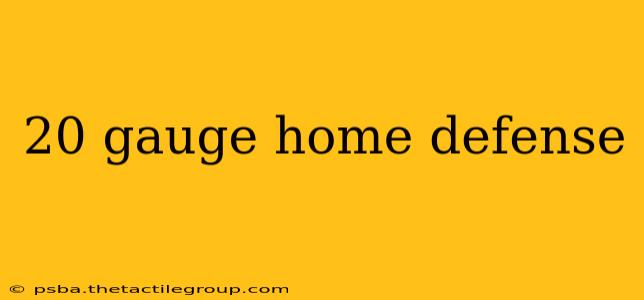Choosing the right firearm for home defense is a deeply personal and critical decision. While many gravitate towards larger calibers, the 20 gauge shotgun offers a compelling alternative, balancing power, recoil, and ammunition availability. This comprehensive guide explores the advantages and disadvantages of a 20 gauge shotgun for home defense, helping you make an informed choice.
Advantages of a 20 Gauge for Home Defense
-
Reduced Recoil: This is perhaps the 20 gauge's most significant advantage over its 12 gauge counterpart. The lighter recoil makes it easier to handle, especially for smaller individuals or those less experienced with shotguns. Faster follow-up shots are possible due to less muzzle jump, a crucial factor in a high-stress home defense situation.
-
Manageable Weight: 20 gauge shotguns are generally lighter than 12 gauges, making them easier to maneuver and less tiring to hold during extended periods. This reduced weight is particularly beneficial for those needing to carry the firearm around the house.
-
Ample Ammunition Options: While not as ubiquitous as 12 gauge ammo, 20 gauge shells are readily available at most sporting goods stores and online retailers. You'll find a wide variety of shot types, including buckshot, birdshot, and slugs, providing options tailored to different home defense scenarios.
-
Less Noise (Potentially): While not universally true, some shooters find that 20 gauge shotguns produce slightly less noise than 12 gauge shotguns, potentially reducing the risk of hearing damage in a close-quarters situation.
-
Cost-Effectiveness: Generally speaking, 20 gauge ammunition is less expensive than 12 gauge ammunition. This can be a significant factor for those needing to maintain a substantial amount of home defense ammunition.
Disadvantages of a 20 Gauge for Home Defense
-
Less Stopping Power (Compared to 12 Gauge): This is the primary drawback. While still effective, a 20 gauge generally delivers less stopping power than a 12 gauge, particularly with buckshot loads. The reduced shot size means potentially fewer pellets hitting the target.
-
Penetration Concerns: Over-penetration is a significant concern with any home defense firearm. While the reduced power of a 20 gauge compared to a 12 gauge might seem advantageous in this regard, careful shot placement remains paramount to avoid unintended consequences. Ammunition selection plays a crucial role in mitigating this risk.
-
Limited Availability (Compared to 12 Gauge): While readily available, the selection of 20 gauge shotguns and ammunition is generally smaller than that of 12 gauge options.
Ammunition Considerations for Home Defense
The choice of ammunition is crucial for effective home defense. For a 20 gauge, consider these options:
-
Buckshot: Offers a good balance of penetration and stopping power, ideal for home defense scenarios. Look for 00 buck or #1 buck.
-
Slugs: Provides maximum penetration but with a narrower spread, requiring more precise aiming. Suitable for longer distances or situations where over-penetration is less of a concern.
-
Birdshot: Generally not recommended for home defense due to its low stopping power. It’s important to understand the limitations of each round.
Choosing the Right 20 Gauge Shotgun
When selecting a 20 gauge shotgun for home defense, consider these factors:
-
Pump-action vs. Semi-automatic: Pump-action shotguns are generally more reliable and less expensive. Semi-automatic shotguns offer faster follow-up shots, but can be more complex and prone to malfunctions.
-
Barrel Length: Shorter barrels are easier to maneuver in tight spaces, but may reduce accuracy and potentially increase noise.
-
Ergonomics: Choose a shotgun that fits comfortably in your hands and is easy to operate under stress.
Conclusion: Is a 20 Gauge Right for You?
The 20 gauge shotgun presents a viable option for home defense, particularly for individuals who prioritize reduced recoil and manageable weight. However, it's crucial to understand its limitations compared to the 12 gauge. Careful consideration of ammunition selection and responsible gun handling practices are essential for effective and safe home defense. Ultimately, the best firearm is the one you can handle effectively and confidently in a stressful situation. Consult with experienced firearm instructors and consider professional training before making your final decision. Remember that this information is for educational purposes only, and you should always comply with all applicable laws and regulations regarding firearms ownership and use.

